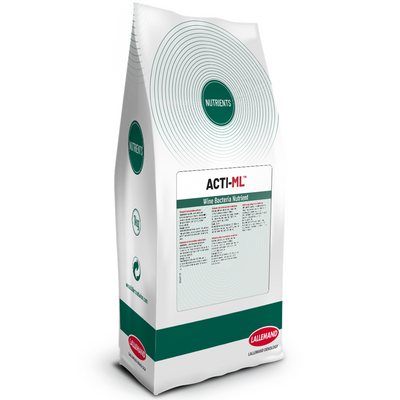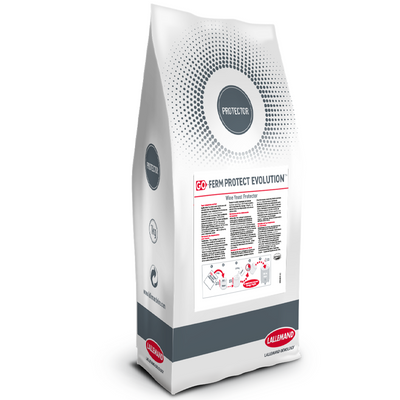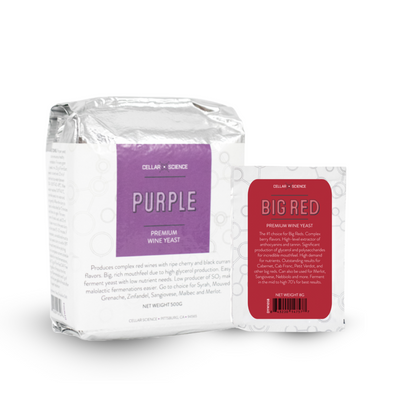Wine Yeast - Alcoholic Fermentation:
When we add wine yeast to our must, the yeast consume the sugars and create alcohol and CO2 as by-products. This transformation of sugar into alcohol by the wine yeast is what turns the juice/must into wine and is the basis of all winemaking. Each wine yeast has its own unique set of flavors and aromas, so take a look at our Yeast & Grape Pairing Manual to help find the one(s!) that are best suited to your winemaking style. Remember, it's the wine yeast who are actually making the wine, we as winemakers just provide the introduction and handle the details!
Malolactic Bacteria - Malolactic Fermentation:
In addition to wine yeast, there is another organism that we can use to round-out and add complexity to our wines: malolactic bacteria. Malolactic bacteria consume malic acid (naturally present in the grape) and convert it to lactic acid. Lactic acid is roughly half as strong as malic acid, so when it reduces/replaces the malic acid in the wine the pH goes up (and the TA goes down). The result is that the wine becomes less tart, softer and fuller than it was before the malolactic fermentation. Depending on the grape varietal and the style of wine we are looking to make, this may or may not be a good thing. As a general guideline most red wines undergo a complete malolactic fermentation and benefit from doing so. White wines can vary from full (barrel-fermented Chardonnay), partial, or no malolactic fermentation ("New-World" Sauvignon Blanc). There is no "right" choice - it just depends on the style of wine your are making. Complete information on alcoholic and malolactic fermentations can be found in our Red Winemaking and White Winemaking Manuals!
Wine Yeast, Malolactic Bacteria & Additives
-


CellarScience® ORIGIN Dry Yeast | Hard Seltzer Yeast | Distillers Yeast
The ideal yeast for producing a very neutral, clean base for hard seltzers, canned cocktails, further distillation, etc. Works with malt or sugar fermentations Includes nutrients and pH buffers to keep fermentation humming to finish Able to handle high levels of ethanol and osmotic pressure Ferments clean up to 80°F Our motto is to Empower Your Creative Vision. Origin is a unique style of yeast used to create a neutral alcoholic base that acts as the Origin upon which you layer other flavors. Perfect for Hard Seltzers, Canned Cocktails, and whatever else you can dream up. Also great for neutral washes designed for distillation and tough to ferment honey-based mead fermentations. Works on both sugar, honey, and malt-based fermentations. The secret sauce is a very neutral, high alcohol tolerant yeast combined with nutrients and pH buffers. The non-urea-based nutrients help the yeast in simple sugar mediums naturally low in nutrients. pH buffers ensure a high enough pH to allow the yeast to run to completion in even the toughest of situations. The yeast strain used in Origin is a very low producer of H2S and fruity esters resulting in a clean final product. Origin stays clean at higher fermentation temperatures up to 80°F. Origin could technically be called a Turbo Yeast being packed with nutrients. However, we don't like that association as many turbo Yeasts are not selected and assembled for quality and flavor but rather price and speed. Turbo Yeasts also do not include pH buffers. Origin will work with all commonly used sugars, including sucrose, dextrose, and liquid invert sugar. When fermenting wort from malted barley, use our Brutzyme Glucoamylase Enzyme to break down α-1,4 and α-1,6 glycosidic linkages of starch, dextrins, and oligosaccharides for a drier, more fully attenuated final product. Pilot batches should always be performed to find the optimum final product for your further vision. Directions: Add 10 to 20 g per gal (2.5 to 5 g per liter) directly into your fermentation with no hydration required. Ferment between 65 to 80°F (18-27°C). We recommend starting with a dosage of 15 g per gal (4 g per liter) and adjusting as desired in future batches.
$7.99
-


CellarScience® Clearzyme | Beer Clarifier
Clearzyme by CellarScience is an enzymatic solution to create clear beer by breaking down haze causing proteins so they cannot later bind with tannins. Because it specifically targets only haze active proteins, it has no effect on flavor, aroma or head retention. Use: Add 1/4 tsp per 5 gallons at the start of fermentation. Works best at a temperature range between 50-68°F and pH of 4-6. Additional Notes: Clearzyme is a protease, or proteolytic, enzyme that partially or totally hydrolyzes peptide bonds in protein. The resulting protein fractions are then too small to bond with the polyphenols in hops. One of the huge benefits of Clearzyme is that it removes the need to cold crash, saving time and energy. Clearzyme also breaks down the Gluten protein that causes allergic reactions. Beers made with barley and wheat that have had Clearzyme added typically show gluten levels below 20ppm. Store at temperatures under 70°F. Immediately recap bottle after each use. The recommended shelf life is 12 months from the date the package is opened.
$3.99
-


CellarScience® Brutzyme | Glucoamylase Enzyme
Brutzyme by CellarScience is an enzymatic blend used to produce dry beers. Perfect for making Brut IPAs or any other style where a low gravity, dry finish is desired. Amyloglucosidase, alpha amylase, and pullulanase combine to enable the hydrolysis of starch and dextrins into fermentable sugars that yeast can ferment. Use: Add 1/4 tsp per 5 gallons at the beginning of fermentation. Brutzyme can be added directly to the fermenter at the same time yeast is pitched. Works best at a temperature range between 50-68°F and a pH of 4-5.5. Additional Notes: Brutzyme is a mix of amyloglucosidase, a-amylase, pullulanase and other dextrinases capable of breaking down the α-1,4 and α-1,6 glycosidic linkages of starch, dextrins and oligosaccharides completely into fermentable sugars. Brutzyme is extremely affective for making very dry beers, especially Brut IPAs. Store at temperatures under 70°F. The recommended shelf life is 12 months from the date the package is opened.
$7.09
-


CellarScience® BAJA Dry Yeast | Mexican Lager | Premium Beer Yeast
A cold fermenting Mexican yeast that produces clean, crisp lagers. Originally developed and popularized by the Modelo Group, this versatile strain has a neutral character and finishes dry. Perfect for Mexican-style light lagers, dark lagers, and cold IPAs. Every batch is PCR tested to ensure contamination free yeast. Dosage: Two sachets are enough to treat a 5–6 gallon batch. When calculating for larger batches, use at a rate of 2.5–4 grams per gallon of wort. We recommend rounding up by one full sachet rather than measuring out the yeast exactly. Direct Pitch or Rehydrate: BAJA yeast is designed to be sprinkled directly onto the surface of your wort with no oxygenation required in the initial fermentation. Our aerobic growth process makes this possible by creating dry yeast with high viability and high sterol levels. BAJA yeast is pre-loaded with essential nutrients to ensure a successful, complete fermentation. While not required, some brewers prefer to rehydrate yeast. To hydrate yeast, first, sanitize the yeast brick and scissors. Use 10 grams of sterilized tap water between 85-95°F (29-35°C) mixed with 0.25 grams of FermStart per gram of yeast. Sprinkle yeast on the water. Allow the slurry to stand undisturbed for 20 minutes, then swirl. Use small amounts of wort to adjust to within 10°F (6°C) of wort temperature before pitching. Ferment between 50-56°F (10-13°C). Optimum Fermentation Temp: 50-56°F Flocculation: Medium-High Alcohol Tolerance: 10-11% ABV Attenuation: 75-85% Similar Strains: WLP940 Gluten-free
$4.79 $3.59











